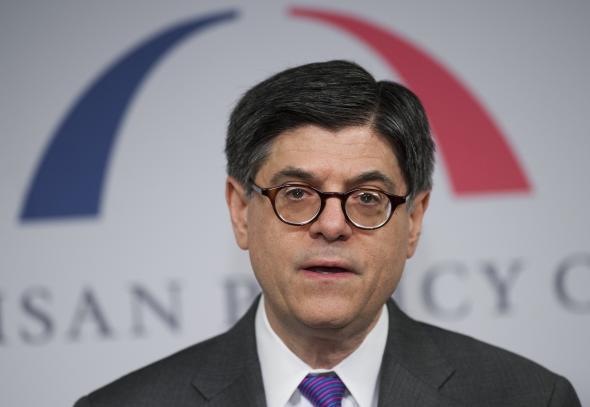Karl Marx wrote that history repeats itself: The first occurrence is tragedy, the second is farce. House Republicans now seem determined to ask what happens when you get a third go at it.
The subject is the debt ceiling.
On Monday, Treasury Secretary Jack Lew gave a speech warning Congress that the Treasury Department’s borrowing authority would lapse this week. From then on, federal operations will continue thanks to the use of the now-customary (and obsoletely named) “extraordinary measures.” But sometime around the end of the month, those measures will reach their limits. A situation will then arise in which the tax revenue the government is legally permitted to collect will be insufficient to cover the bills the government is legally required to pay—and the government will also be legally prohibited from borrowing money to close the gap. That would result in either a constitutional crisis or a financial crisis or both, as the Treasury would be faced with a paradoxical legal situation and the practical obligation to violate some kind of law or procedural norm.
The simple way out of the abyss would be for Congress to do what Congress has always done: authorize more borrowing. After all, it’s not as though the White House is just flinging money around willy-nilly. The funds the government spends are the funds appropriated in various acts of Congress, plus the so-called mandatory spending required by the Social Security Act and other laws.
Republican leaders agree that pushing the country into a state of budgetary anarchy would be wrong. But they will only raise the debt ceiling if Democrats give them substantive policy concessions. In particular, they want to eliminate a provision of the Affordable Care Act known as “risk corridors,” which are important to ensuring the financial stability of the new health insurance exchanges over their first few years of operation. The White House believes—sensibly—that since neither Republicans nor Democrats believe a debt ceiling crisis to be a desirable outcome, Democrats shouldn’t make policy concessions in order to avoid it.
If it feels like you’ve read this column before—and recently—it’s because you have. And recently!
It was just a few months ago when we last found ourselves in this situation. Except back then the Republican demands were more extreme: They wanted total repeal of Obamacare. And the time before that, they wanted big changes to Social Security and Medicare and Medicaid. What they settled for back in early 2013 was a symbolic “No Budget, No Pay” law. Then last fall they accepted adding a meaningless income verification provision to the health care law.
In other words, during the course of 2013, Republicans twice tried to obtain enormous policy concessions in exchange for raising the debt ceiling and ultimately settled for fig leaves. This time around, nobody is even taking their threats remotely seriously. Not only have repeated surrenders drained the threat of all credibility, but rehashing this issue has educated the public. Because more borrowing sounds bad, votes to increase the debt limit used to be unpopular and afford the opportunity for ample political grandstanding. But the GOP’s repeated efforts to turn the debt ceiling into a policymaking tool have given people ample time to understand the issue. A poll released Monday evening shows that a clear majority of the public will blame Republicans if an agreement isn’t reached.
So the stage is set for the next cave-in. At first, no member of the House GOP caucus will want to risk the wrath of talk radio by suggesting surrender. We’ll hear from the leadership that there’s no way a “clean” bill can gain the support of the GOP caucus, and therefore no way it can come to the floor. As we get close to the last minute, the leadership will suddenly remember that it’s allowed to pass bills that are mostly supported by Democrats. The debt ceiling will be raised, and the White House will make no real concessions. That’s how it went the last two times, and that’s how it’ll go down this month. The only really interesting question is whether some meaningless fig leaf will be included in the deal.
There’s always at least a small chance that something will go terribly wrong. That somehow the inevitable last-minute deal won’t come together, and the sky will fall as American finance collapses into a tangle of legal ambiguity. If John Boehner and Mitch McConnell have any sense, they’ll recognize that whatever potency the debt ceiling may have once had as a vehicle for advancing the conservative cause is now gone. The threat is a joke, unless somehow it becomes a disaster. Moneybox has been calling for permanent abolition of the debt ceiling since before I got to Slate, and it’s an idea that’s never been timelier.
